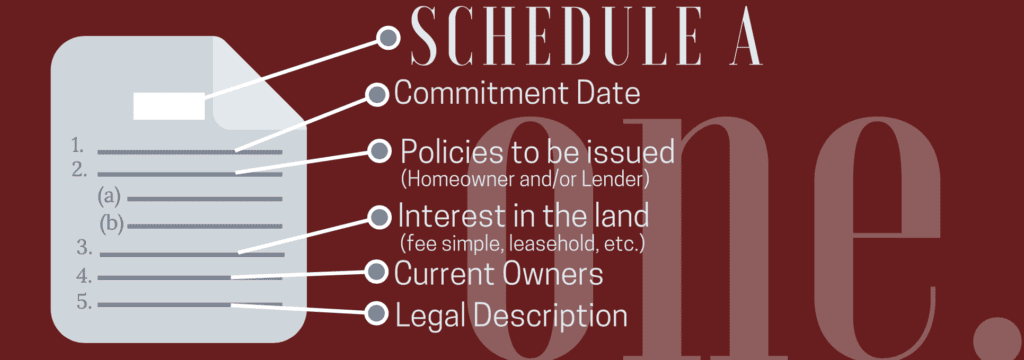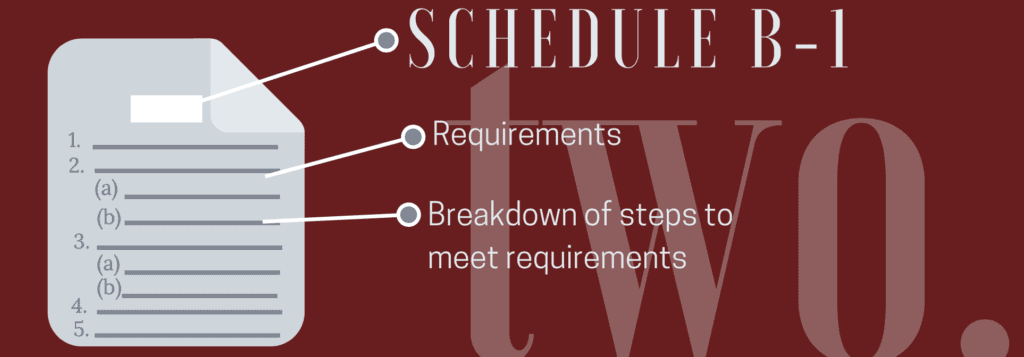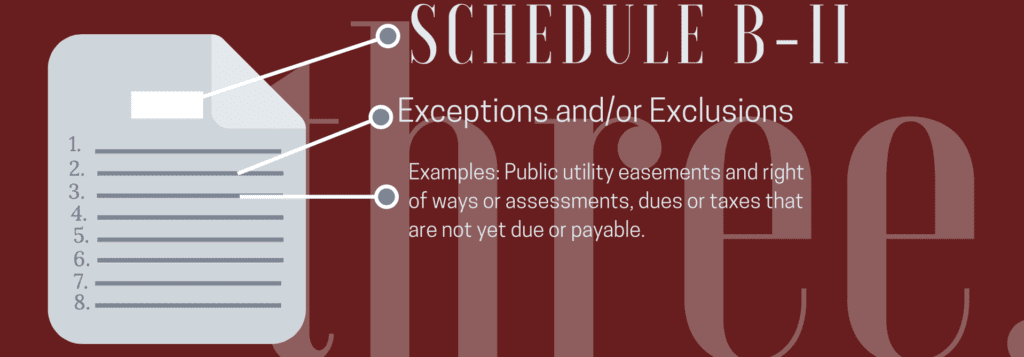The Commitment for Title Insurance reports the findings of an initial title search. It will contain the terms, conditions, and exclusions covered in the policy. This document is a promise to issue title!
There are three basic parts of an ALTA Title Commitment. They are; Schedule A, Schedule B-I, and Schedule B-II.
Schedule A:

SCHEDULE A reflects the information provided to the Title Department as a result of the purchase contract and a preliminary search of the public records. This can include information like the legal description of the property, sales price, loan amount, lender, name, and marital status of Buyer and Seller.
What to look for: Be sure there are no discrepancies in the basic info found on the purchase agreement, the deed, and the closing disclosure.
Schedule B-I:

When reviewing your commitment, be sure to read this section carefully because it defines your use of the property. There may be restrictions that will cause you to reconsider your purchase. If anything you see is concerning, ask for clarification.
Requirements are items that Pioneer Title Agency needs to eliminate from the title in order to provide a clear, unencumbered title to the Buyer.
A few examples of things that must be cleared are:
- Payment of property taxes
- Assessments owed of record
- Any encumbrances (or liens) on the property
Often encumbrances show up because another individual has a name similar to one of the parties in the escrow. Pioneer Title Agency may ask for a Statement of Identification in order to determine whether items that show up are related to our parties and whether they can be removed.
What’s the norm? A common requirement is that the title company will ensure the title is properly conveyed to the new owner, and a mortgage or deed is recorded in their name while the old mortgage lien is released.
Schedule B-II

This section covers things the policy will NOT insure. It is possible to work with Pioneer Title Agency to insure some items with an endorsement or eliminate the exception by obtaining a release, affidavit, waiver, quitclaim deed, or other official document.
Exceptions are items that run with the land. They are called “exceptions” because the Buyer will receive clear title except the Buyer’s rights to use the property will be subject to the exceptions described in this section. Exceptions include Covenants, Conditions and Restrictions (CC&Rs), easements, homeowner’s association rules, mineral rights as reserved in patents, leasehold interests, and other items which will remain of record following transfer of the property.
What is Covered vs. What is not?
General Policy Coverage: Title insurance provides assurance you can access and use your land. In summary, this coverage will minimize risk and protect you against:
- The possibility that someone else owns or has claim to your property
- Defects caused by fraud, forgery, or incompetence
- Defective recording of any document
- Unmarketability of title
- Lack of legal access to and from the property
Items and Issues not Covered: Some rights are not protected by your title insurance policy. Examples may include:
- Land trusts
- Life estates
- Air rights above the property
- Mineral, water right, and timber reservations
- Matters that a physical inspection would disclose
- Restrictive covenants that limit the use of the property to a single use
- Matters that an accurate survey would show: Easements, Rights-of-Way, etc.
- Set-Back requirements that designate where improvements must be located
- Rights of holders of liens such as judgments, tax liens, street improvement liens, etc.
More About Title Insurance:
Click here to learn more about Title Insurance! If you have additional questions, reach out to your escrow officer today!